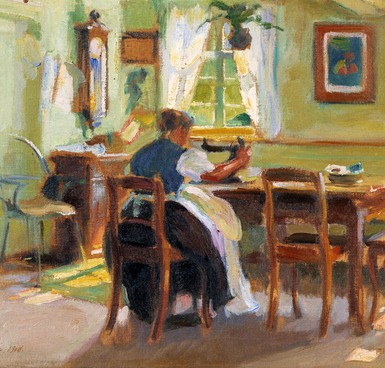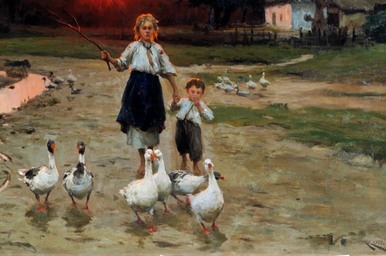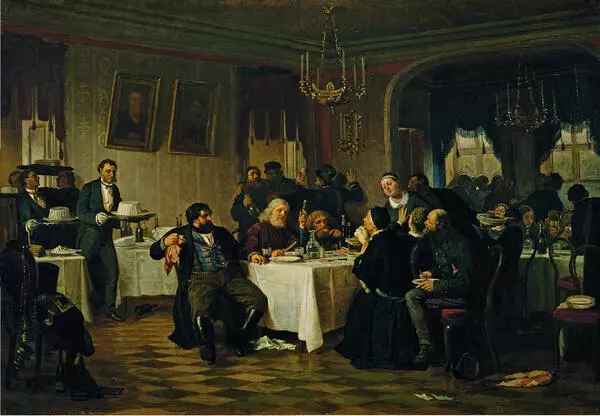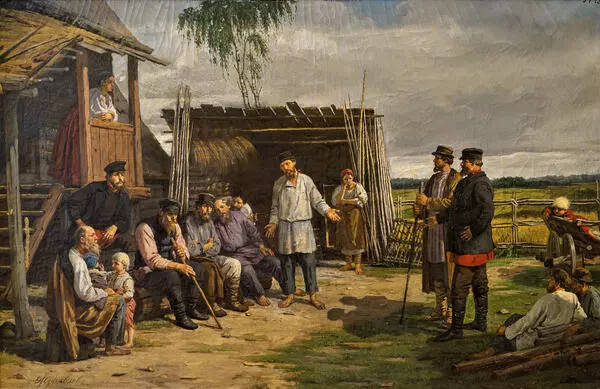Russian genre painter Thyrs Zhuravlev was born in 1836. He learned painting at the Imperial Academy of Art. When a student, he took part in the well-known ‘uprising of the fourteen’: together with other painters headed by Ivan Kramskoy, he refused to participate in the Gold Medal Competition that would guarantee a six-year sponsored trip to Italy.
Academy students undertook that move because of the new rules of the Competition that stipulated conditions of inequality of genre painters and history painters. Although Emperor Alexander II was informed of the protest and some of the uprising participants were kept under police observance, all the protesters successfully graduated from the Academy, and some of them were later made Academicians of Painting: Zhuravlev was awarded the title in 1874.
After this event Zhuravlev took part in establishing the St. Petersburg Association of Artists: the first independent art alliance in the history of Russia. Although the painter became famous due to his pictures on the subject of merchant’s life and genre painting as a whole, he did not join the Association of Itinerants, members of which consistently developed social subjects. On the contrary, he was a member of the Society of Exhibitions Works of Art that competed with the Itinerants.
A small painting Blessing is one of the genre works by Zhuravlev. It shows the interior of a room with multicolored wallpaper. In the left corner, there are icons and underneath, a small table with a burning icon-lamp. At the table, there is a priest who is blessing a bent-down man. A woman in a light-colored jacket and a flounced skirt is watching the scene; to the right, a man at the door is taking out some belongings. Another woman is depicted at the left-hand side of the painting: she is resting against the table and, most likely, is praying together with the priest. The painting is made in grey and brown shades.
It remains unknown what particular scene is shown in the picture: it may be a move of the whole family to a new place, or parting with family members departing for a long trip. One can say for sure that this is an important event: national tradition and manners of that time supposed as given that blessing from a priest should be received at critical moments of life.
Academy students undertook that move because of the new rules of the Competition that stipulated conditions of inequality of genre painters and history painters. Although Emperor Alexander II was informed of the protest and some of the uprising participants were kept under police observance, all the protesters successfully graduated from the Academy, and some of them were later made Academicians of Painting: Zhuravlev was awarded the title in 1874.
After this event Zhuravlev took part in establishing the St. Petersburg Association of Artists: the first independent art alliance in the history of Russia. Although the painter became famous due to his pictures on the subject of merchant’s life and genre painting as a whole, he did not join the Association of Itinerants, members of which consistently developed social subjects. On the contrary, he was a member of the Society of Exhibitions Works of Art that competed with the Itinerants.
A small painting Blessing is one of the genre works by Zhuravlev. It shows the interior of a room with multicolored wallpaper. In the left corner, there are icons and underneath, a small table with a burning icon-lamp. At the table, there is a priest who is blessing a bent-down man. A woman in a light-colored jacket and a flounced skirt is watching the scene; to the right, a man at the door is taking out some belongings. Another woman is depicted at the left-hand side of the painting: she is resting against the table and, most likely, is praying together with the priest. The painting is made in grey and brown shades.
It remains unknown what particular scene is shown in the picture: it may be a move of the whole family to a new place, or parting with family members departing for a long trip. One can say for sure that this is an important event: national tradition and manners of that time supposed as given that blessing from a priest should be received at critical moments of life.



